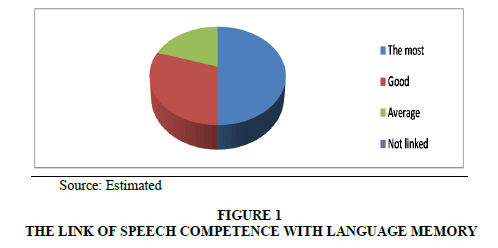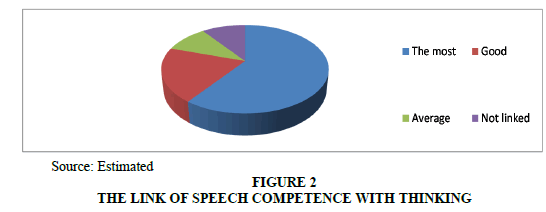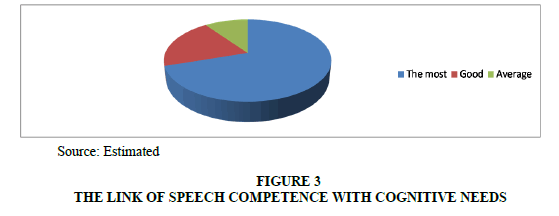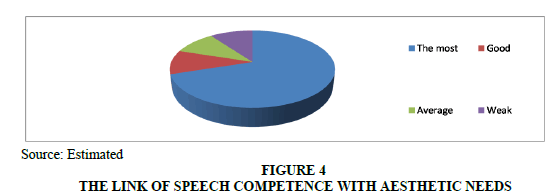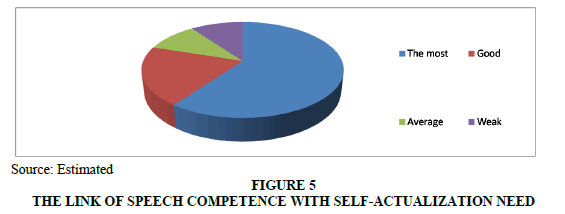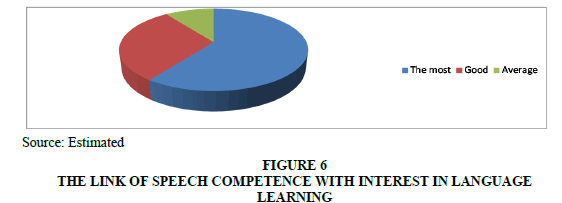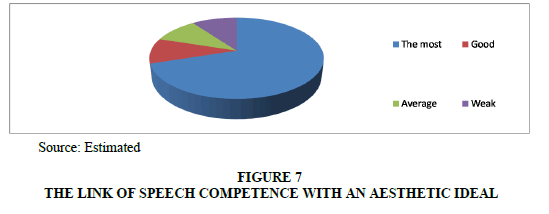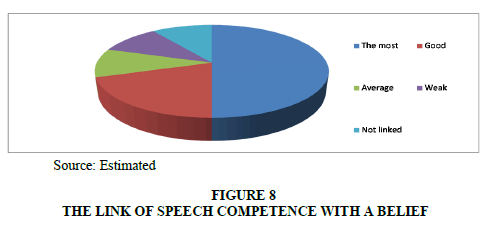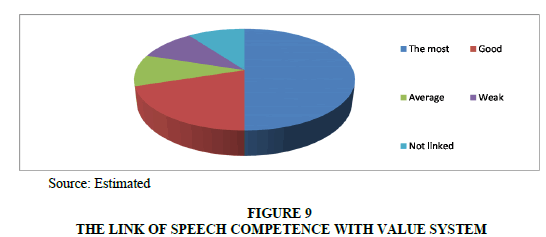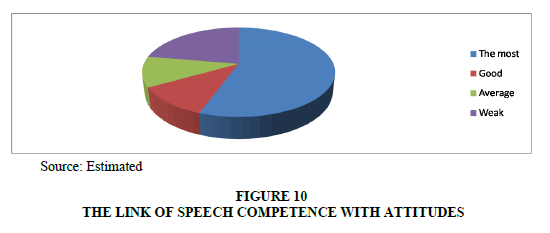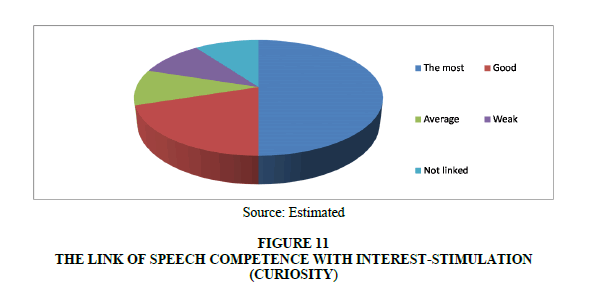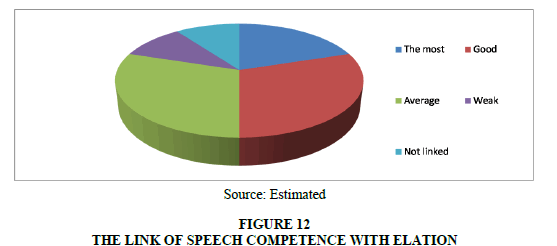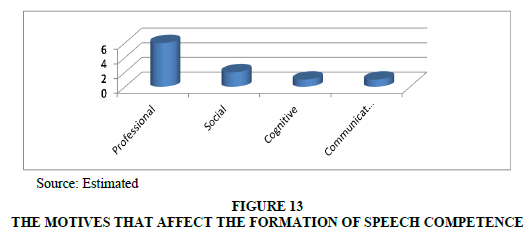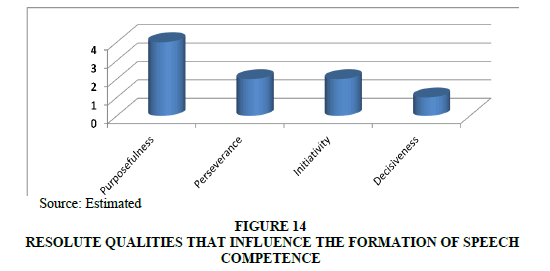Research Article: 2021 Vol: 20 Issue: 5
Factors Affecting the Development of Speech Competencies: A Managerial and Organizational Perspective
Olga Alexandrovna Ovsyannikova, Research Center of Problems of National Security
Mikhail Yuryevich Zelenkov, Moscow State Academy of Water Transport
Branch of FSBEI HE State University of the Sea and River Fleet named after
Admiral S.O. Makarova and Moscow State Technical University named after N.E. Bauman (National Research University)
Yuliya A. Laamarti, Financial University under the Government of the Russian Federation
Podvoyskaya Nataliya Leonidovna, National University of Science and Technology "MISiS"
Tatiana L. Kashchenko, Financial University under the Government of the Russian Federation
Nurul Mohammad Zayed, Daffodil International University
Abstract
The article deals with the analysis of advanced techniques that reveal the dependence of speech competence of students on various factors in the aims of improving speech culture of future specialists. The features of conducting a summative assessment that indicate the conditions for the development of speech competence of students are exposed. The factors affecting the formation of speech competence are elicited. These encompass the following: well-developed verbal memory, language memory, eye-mindedness, verbal reasoning; cognitive and aesthetic needs; self-actualization needs; interest in learning; aptitude to learn languages; beliefs; value system; attitude; professional value motives; positive emotions and others. The main research methods associated with the determination of patterns are theoretical and methodological analysis of the problem, comparative analysis, contrast, mental modeling, empirical research, mathematical methods for data processing which provide us with an opportunity to determine stable links and relations, trends, as well as generalization of the identification of conditions of formation and development of students’ speech competence, study of the speech activity of specialists. The techniques used in the study assessed the individual characteristics of students, which were examined in their dynamics and comprehensively in terms of their inherent patterns: maturation, development, becoming and formation of psychological attributes. The scientific result was comprehension of the factors affecting the development of speech competencies.
Keywords
Speech Competencies, Development, Professional Value, Attitude, Motives, Comparative Analysis.
Introduction
Speech competence contributes to the success of a specialist, increment in their activity, solution of professional problems; it is one of the main conditions for the formation of a personal background of a real professional. Of course, improving the quality of language training definitely requires a scientifically grounded purposeful methodological support. This article is supposed to consider the current state of speech competencies of higher education students. The identification of the conditions for development and formation of future specialists’ speech competence by means of using the method of expert assessments is an urgent problem of this study. With that in mind, the research hypothesis is the assumption that the process of formation and development of verbal competence will be effective if: it is learner-oriented, that is, it will take into account the psychological, social, age characteristics of students in higher educational establishments; the formation of verbal competence will be based on subjective, axiological, activity, competency-based approaches, the main of which are the competency building approach, which suggests a meaningful analysis of all components (in this case, speech competencies); the mechanism for the formation of students’ speech competence will be based on the consideration of factors and conditions of this process: motivation, development of cognitive processes, aesthetic needs; self-actualization needs; students’ interest in learning languages and others.
Literature Review
Bobrova (2011) and other scholars turned to the problems of definition of linguistic, language, cultural, social, communicative competences. The substantiation of the leading role of speech communications in professional competence was facilitated by the ideas of Bobrova (2011) and others. The specifics of communicative competence, structural components, and functions are revealed in the studies by Herron et al. (2013) and others. The understanding of the characteristics of verbal competence in relation to the pedagogical aspect was carried out in a comparative analysis of this concept with the culture of speech, linguistic, language, sociocultural, cultural and communicative competences (Ivanchikova, 2012). The source of distinction and selection of qualities, knowledge and skills of the content of the criteria of linguistic competence were the works by Mull (2013) and other researchers. At the same time, today the problem of the formation of speech competence of future specialists is not sufficiently developed. Currently, there are only a few scientific studies dedicated to the study of individual aspects of this problem (Ovsyannikova, 2016). These works are concerned with the development of technologies aimed at developing the speech competence of various specialists, for example: lawyers, economists and others. The investigation of this question was carried out as part of the methodology of teaching speech culture in respect to the pedagogical and methodological aspects. Speech training of specialists of a certain area of competence is the issue of concern of many specialists: Beletskaya (2016); Lugovskaya (2017); Veremeichik (2013). System research of the formation of speech competence of future specialists has not been carried out by psychologists, sociologists to the full extent. Consequently, the author has not identified a problematic field, being at the intersection of such domains of psychology as educational psychology and psycholinguistics.
Methodology
The main research methods connected with the determination of patterns are theoretical and methodological analysis of the problem, comparative analysis, contrast, mental modeling, empirical research, mathematical methods of data processing that allow you to determine stable links and relations, trends, and generalization. To identify the conditions for the formation and development of students’ speech competence, the investigation of specialists’ speech activity was conducted. The methods used in the study provided us with an opportunity of evaluating the individual characteristics of students, which were considered in their dynamics and comprehensively in terms of their inherent patterns: maturation, development, becoming and formation of psychological attributes. The research, which was carried out at Moscow Regional University, used the questionnaire method and the method of summative assessments. The questionnaires elaborated by experts were analyzed and the factors affecting the development of speech competencies were distinguished.
Results and Discussion
During summative assessment, the concept of “speech competence of a future specialist” was ascertained. The students’ speech competence is a personality characteristic that reflects the ability to carry out communicative and professional interaction, reflection and motivation of speech behavior, expressed in a certain level of linguistic, communicative, professional training of individual as a personality. Speech competency is the ability to realize the experience of language activities, as well as knowledge of the lexical, grammatical, phonetic laws of the language, skills and abilities of building utterances and various kinds of texts with account taken of the specifics of professional engagement. The level of development of language competence is dependent on reader interests, linguistic abilities, personal qualities, cognitive processes, personality traits (temperament), work with analytical materials, and work with scientific literature. During ascertaining experiment, the method of expert assessment was used. To conduct the study, aimed at determining the factors of speech competence of students, the author also composed a questionnaire consisting of 15 questions. A group of experts (ten lecturers from Moscow Regional University) assessed the relations between language competence and various factors on a five-grade scale. For example, they determined the dependence of language competence on such cognitive process as language memory. It was explained that language memory acts as a very complex system of interacting operations: semantic, syntactic, lexical, morphological, morpho-syntactic, phonemic and phonetic. The experts answered as follows: “The most” – 5 out of 10 people, “Good” – 3 experts, “Average” – 2 experts (Figure 1).
The link of speech competence with such cognitive process as thinking (eye-mindedness, verbal reasoning) was offered for the experts to assess. It turned out that there was a direct relationship between speech competence and thinking. “The most” - 6 people, “Good” - 2 people, “Average” - 1 person, “Not linked” - 1 person (Figure 2).
When determining the relation between speech competence and cognitive needs, the experts established the following: “The most” - 7 out of 10 people, “Good” - 2 experts, “Average” - 1 expert (Figure 3).
Experts suggested that the connection between speech competence and aesthetic needs is obvious: “The most” – 7 out of 10 people, “Good” – 1 expert, “Average” – 1 expert, “Weak” – 1 expert (Figure 4).
It was necessary to evaluate the extent to which speech competence and self-actualization needs were linked. The experts answered as follows: “The most” – 6 out of 10 people, “Good” – 2 experts, “Average” – 1 expert, and “Weak” – 1 expert (Figure 5).
Similarly, the connection of speech competence and interest in language learning was established. The experts answered as follows: “The most” – 6 out of 10 people, “Good” – 3 experts, “Average” –1 expert (Figure 6).
It was necessary to assess the extent of dependence of speech competence on the aptitude to learn languages (a person’s selective orientation toward a certain activity, manifested in their enthusiasm for it, the desire to study it). The overwhelming majority of teachers included in the expert group spoke in favor of the connection between speech competence and the aptitude for languages. The experts answered as follows: “Most” – 9 out of 10 people, “Good” – 1 expert. The expert group evaluated the dependence of speech competence on an aesthetic ideal (the idea of an impeccable, aesthetically perfect state of something. The ideals of this kind are formed both in relation to a person (for example, the ideal of female beauty), and in relation to the world, objects of material and spiritual culture), as well as the social ideal (the ideal of the perfect state of a social object or phenomenon (the ideal of the family, the ideal of friendship). The experts answered as follows, “Most” – 7 out of 10 people, “Good” – 1 expert, “Average” – 1 expert, “Weak”–1 expert (Figure 7).
The expert group analyzed the connection of speech competence with a belief (certain knowledge, an idea of any object or phenomenon, accompanied by a firm, deep and subjectively substantiated confidence of a person in its truth). The experts found the following, “The most” - 5 out of 10 people, “Good” - 2 experts, “Average” –1 expert, “Weak” –1 expert, “Not linked” - 1 expert (Figure 8).
The expert group also established the link of speech competence with personal system of values (the commitment of a person to a certain value, that is, a significant, important object for them). The experts found the following, “The most” – 5 out of 10 people, “Good” – 2 experts, “Average” – 1 expert, “Weak” – 1, “Not linked” – 1 expert (Figure 9).
The expert group established the connection of speech competence with attitudes (states of readiness, aptitude for activities, with the help of which this or that need can be satisfied). The experts answered as follows, “The most” – 5 out of 10 people, “Good” – 1 expert, “Average” – 1 expert, “Weak” – 2, “Not linked” – 1 expert (Figure 10).
The expert group determined the connection of speech competence with interest-stimulation (a sense of curiosity). The experts answered as follows, “The most” – 5 out of 10 people, “Good” – 2 experts, “Average” – 1 expert, “Weak” – 1 expert, “Not linked” – 1 expert (Figure 11).
The expert group was asked to determine the link of speech competence with elation (joy is a positive emotion associated with the ability to fully satisfy a current need, the probability of which was previously uncertain or small). The experts answered as follows, “The most” – 2 = out of 10 people, “Good” – 3 experts, “Average” – 3 experts, “Weak” – 1 expert, “Not linked” – 1 expert (Figure 12).
The members of the expert group arranged the motives affecting the formation of speech competence in descending order. More than half of the experts, 6 out of 10, put professional and value motives first, 2 experts – social and value motives, 1 expert – cognitive, 1 expert – communicative. Aesthetic, traditional-historical, utilitarian-practical (mercantile) motives were ranked as the last. Thus, most experts believe that professional-value, social-value, cognitive, communicative motives play a decisive role in the formation of speech competence (Figure 13).
The expert group established a certain dependence of speech competence on moral ethical awareness (the experiences when perceiving and evaluating the actions, deeds or mental characteristics of people (including themselves) from the standpoint of norms and principles of public morality. Aesthetic sensibility is close to them – the sensibility of the beautiful or the ugly in the world around us. More than half of the experts have determined that this relationship is revealed to a greater extent. In a similar way, the dependence between speech competence and intellectual awareness (the experiences that accompany mental activity) was determined. Non-specific intellectual senses include an experience that happens not only with mental activity: curiosity, surprise, confidence, doubt, a sense of new, a sense of humor. The members of the expert group were offered to arrange resolute qualities that influence the formation of speech competence in descending order. More than half of the experts, 4 out of 10 people, ranked purposefulness as first, 2 experts – perseverance, 2 experts – initiatively. Decisiveness, endurance was ranked as last. Most experts believe that purposefulness, perseverance and initiatively play a decisive role in the formation of speech competence (Figure 14).
The study has revealed a disparity between an estimated high level of speech competence of the student and the conditions for its formation. It has been found that the formation of the speech competencies of future specialists will then be effective when various types of communication tools are used both by the teachers themselves in the educational process and by the students at the stage of mastering speech knowledge, skills, and the factors that affect the development of speech competence of future specialists will be taken into account. The following factors should be referred to them: cognitive processes, aesthetic needs; self-actualization needs; inclination and interest in language learning, aesthetic ideals, personal system of values, moral and ethical awareness and moral and aesthetic sensibility and others. The following aspects of the development of this problem seem to be most relevant: a more profound case study of the possibility of identifying certain cognitive processes connected with the formation of speech competencies; determination of the effective ways to motivate teachers and students in working on speech culture, a higher interest in language learning via effective technologies of communicative interaction. During the study, the notion of “speech competence of future specialists” was defined. The students’ speech competence is a personality characteristic that reflects the ability to carry out communicative and professional interaction, reflection and motivation of speech behavior, expressed in a certain level of linguistic, communicative, professional training of the person. Speech competency is the ability to implement the experience of speech activity, as well as knowledge of the lexical, grammatical, phonetic laws of the language, skills and abilities to build sentences and various kinds of texts with consideration of the specifics of activities of the profession. So, the formation of speech competence is influenced by a well-developed verbal memory, language memory, such cognitive process as thinking (eye-mindedness, verbal reasoning); cognitive and aesthetic needs; self-actualization needs; interest in language learning; an aptitude for languages (personal preferences for a certain activity, manifested in their keenness on it, aspiration to engage in it); aesthetic ideal (the idea of an impeccable, perfect in an aesthetic sense state of something; beliefs (a certain knowledge, idea of any object or phenomenon, accompanied by a firm, deep and subjectively substantiated confidence of a person in its truth); personal system of values (their personal orientation on a certain value, that is, a significant, important object for them); attitudes (state of readiness, predisposition to activity with which this or that need can be satisfied); professional value motives, social value, cognitive, communicative motives; interest stimulation (a sense of curiosity); elation (it is a positive emotion associated with the ability to fully satisfy a current need, the probability of which was previously uncertain or small); moral and ethical awareness (experiences that arise during the perception and evaluation; moral and ethical awareness (experiences arisen during the perception and evaluation of the actions, behavior or mental characteristics of people (including themselves) from the standpoint of norms and principles of public morality); intelligence (experiences accompanying mental activity). All these factors should be taken into account to draw up a special training program for future specialists with a high level of development of speech competencies.
Conclusion
Thus, the concept of “speech competence of future specialists” has been defined in the study. The students’ speech competence is a personality characteristic that reflects the ability to carry out communicative and professional interaction, reflection and motivation of speech behavior, expressed at a certain level of personal linguistic, communicative, professional training. Speech competence is the ability to implement the experience of speech activity, as well as knowledge of the lexical, grammatical, phonetic laws of the language, skills and abilities of building sentences and various kinds of texts with reference to the specifics of professional engagement. The formation of speech competencies of future specialists is effectively implemented through the optimization of educational process of higher school, the use of various types of communication tools both by the teachers themselves in the educational process and by the students at the stage of mastery of speech knowledge, skills, and also taking into consideration the factors affecting the development of speech competence of future specialists. These include the following factors: cognitive processes, aesthetic needs; self-actualization needs; propensity and interest to learn languages, aesthetic ideals, personal system of values, moral and ethical and moral and aesthetic awareness. Thus, we can draw a conclusion that the hypothesis has a right to exist. All experts confirmed the need to conduct studies of students in order to identify the factors and conditions that affect the process of formation of speech competence of future specialists. In addition to admission tests, it is necessary to conduct studies that help to reveal the level of development of cognitive processes of the personality of a student related to speech as a cognitive process, as well as the motives and needs of this person, in order to draw up a special training program for highly qualified specialists with a high level of speech culture.
References
- Beletskaya, O. (2016). Language culture as a part of preparation of international specialists: Origins and modernity.
- Bobrova, S.V. (2011). The formation of communicative competence at the lesson of Russian.
- Herron, C., Cole, S.P., Corrie, C., & Dubreil, S. (2013). The effectiveness of a video-based curriculum in teaching culture. The Modern Language Journal, 84(4), 518-533.
- Ivanchikova, O.V. (2012). The formation of speech competency of economic science students: Situation approach. Dissertation for Doctor of Pedagogics.
- Lugovskaya, E. (2017). Types of communicative hindrances in the context of multilanguage speaking.
- Mull, J. (2013). The learner as researcher: Student concordancing and error correction. Studies in SelfAccess Learning Journal, 4(1), 43-55.
- Ovsyannikova, O.A. (2016). Optimization of the process of computer-aided particles learning. Dissertation for Candidate of Pedagogical Sciences.
- Veremeichik, O.V. (2013). Communicative Competence as an Educational Phenomenon.
